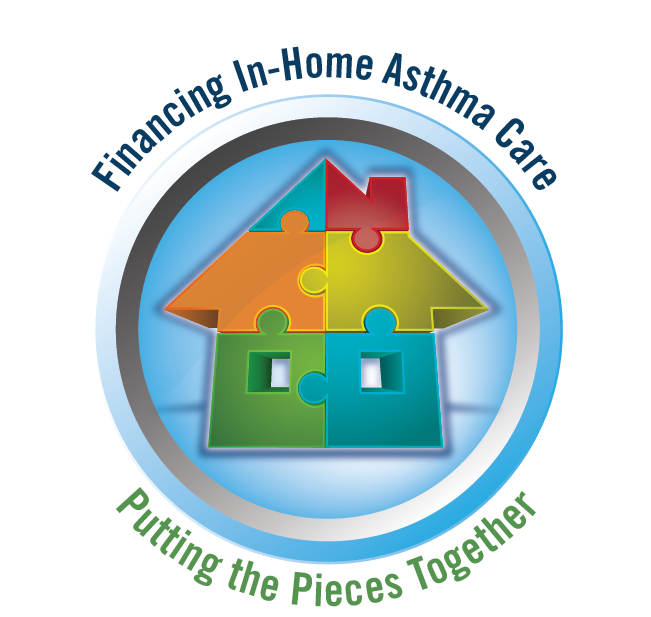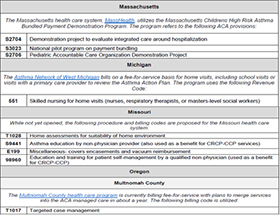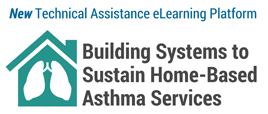Effective Strategies for Reimbursement

The health care policy landscape is shifting rapidly, and opportunities for Medicaid reimbursement for in-home asthma care can vary considerably from state to state, and can change from year to year. It can feel like a lot to learn and navigate.
The information presented here addresses current healthcare financing in place for in-home asthma care and the different forms and solutions pursued across the states.
If you know of financing pathways and models, or reimbursed programs not yet described here, please share your knowledge with our community by sending an email to:
networksupport@asthmacommunitynetwork.org
Medicaid Reimbursement Bill Codes
 The codes listed here are used to bill Medicaid within states for asthma care services.
The codes listed here are used to bill Medicaid within states for asthma care services.
If you know of a program receiving reimbursement for in-home asthma care that is not currently listed, please contact us at networksupport@asthmacommunitynetwork.org.
Medicaid Reimbursement at the State Level
NCHH 2014 Nationwide Survey: Snapshot of Healthcare Financing for Healthy Homes
NCHH conducted a nationwide survey to identify states where healthcare financing for lead poisoning follow-up or home-based asthma services is already in place or pending. Learn more about the 2014 Snapshot of Healthcare Financing for Healthy Homes and the reports it has generated on NCHH's website.
Healthier Washington: Concept Paper - Global Medicaid Transformation Waiver
An overview of Washington state's request for approval from CMS for Section 1115 waiver authority to implement a Demonstration Project that engages and supports Medicaid clients, providers, and communities in achieving improved health, better care, and lower costs (the triple aim).
California Department of Health Care Services: Medi-Cal 2020 - Key Concepts for Renewal
California Department of Health Care Services, 2015.
California's request to CMS for Waiver Renewal of Medicaid Section 1115 to build on successes and focus its efforts on other critical components of health care reform such as expanding access, improving quality and outcomes, and controlling the cost of care.
State Plan Amendment submitted by Multnomah County Environmental Health
This is the State Plan Amendment (SPA) under which Multnomah County Environmental Health's Targeted Case Management- Healthy Homes Program receives reimbursement through Oregon's Medicaid program. As part of the process involved in the submission of this SPA, the state of Oregon submitted a waiver to CMS to waive certain Federal requirements, including the ability to reimburse community health workers for in-home asthma visits.
Massachusetts Section 1115 Demonstration Project Extension Application
This is the response from the Centers for Medicare and Medicaid (CMS) to Massachusetts' request to extend its Section 1115 Demonstration for another five-year term in order to provide time and program sustainability to show continued improvements and to make longer-term investments in initiatives supported by the Demonstration. One of those initiatives that pursues delivery system reform to promote patient-centered care and improved health outcomes while also advancing alternative payment methodologies is the Pediatric Asthma Pilot Project. Attachment F within this document describes the Pediatric Asthma Pilot Project in great detail, including its payment methodologies and capacity building investments funded through the Demonstration.
Preparing for Reimbursement
Pathways to Medicaid Reimbursement for Pediatric Asthma Services
Childhood Asthma Leadership Coalition, 2016
Medicaid offers several strategies for expanding effective community‐based asthma programs for low‐income and medically‐underserved populations. This chart describes these various strategies available to states as they seek ways of supporting community asthma management.
Community Based Approaches for Optimal Asthma Outcomes and Accountable Population Health
Center for Health Policy at Brookings, 2015
As a follow-up to the Brookings Institution and Asthma and Allergy Foundation of America (AAFA) webinar held in May, the Brookings Center for Health Policy has released a related white paper entitled, "Community Based Approaches for Optimal Asthma Outcomes and Accountable Population Health". The paper outlines the issues discussed and provides a framework for accountable population health. It suggests that practice transformation can occur through team-based care, community engagement, and new payment models to help improve outcomes for patients with poorly controlled asthma. We outline several short- and long- term steps that clinical and community service providers can take to aid in the shift towards patient-centered, accountable health systems. The recommendations are sorted into three main categories: 1) Define core non-traditional asthma services for high risk patients; 2) Use payment reform to support integration, system transformation and service coverage; 3) Improve information sharing and coordination for asthma.
A Path Forward: Sustainable Financing for Asthma Education and Home Environmental Trigger Remediation in California
Regional Asthma Management & Prevention (RAMP), 2015. With rising asthma prevalence and numerous changes in the health care system, California faces a unique opportunity to be at the forefront of a national movement by providing much needed prevention-oriented services to its most vulnerable residents. This policy brief is a call to action for the California Department of Health Care Services, Medi-Cal managed care organizations, foundations, hospital community benefit programs, social impact investors, and others to seize these opportunities that will improve the lives of millions of people with asthma. Our goal is to secure sustainable financing for asthma education and home environmental trigger remediation programs in California, based on the strong evidence that they improve health outcomes and reduce health care costs, particularly for those with poorly controlled asthma. The policy brief outlines recommendations to help achieve this goal. RAMP released this policy brief in conjunction with a the California Forum on Sustainable In-Home Asthma Management, hosted by the U.S. Department of Housing and Urban Development and Esperanza Community Housing Corporation on September 10, 2015.
National Governors' Association: Health Investments That Pay Off: Strategies for Addressing Asthma in Children
National Governors Association, 2015. Find recommended steps for state governments to take to incorporate evidence-based asthma interventions for children in their state health care agendas.
Questionnaire created by Nemours to prepare advocates to engage in a dialogue with their State Medicaid officials
Nemours, 2013.
Use this questionnaire as a first step to prepare for engaging your State Medicaid officials. State Medicaid agencies will likely need the information identified in the questionnaire to prepare a Preventive Services State Plan Amendment (SPA).
Roadmaps to Health Coaching
The Roadmaps to Health Action Center is an online platform that delivers access to coaches who provide guidance and tools to understand the data and strategies that communities can use to take action to improve health.
Snapshot of Programs Receiving Reimbursement
Multnomah County Environmental Health was able to secure reimbursement through a State Plan Amendment (SPA) waiver to the Centers for Medicare & Medicaid Services. Oregon's SPA is a good example for anyone interested in state-level policy change to review to understand what one state Medicaid program has identified as a workable accreditation, training, and reimbursement system to support non-medical staff delivering in-home asthma care.
Asthma Network of West Michigan
ANWM partnered with Priority Health, a non-profit health plan, to create a reimbursement system for their home visit program.
DRAFT: Matrix of In-Home Asthma Care Programs Receiving Reimbursement in 2015
A working document, developed for the Northwest Tribal Summit on Improving Outcomes in Children: Securing Sustainable Financing for In-Home Visits, summarizes key components of in-home programs receiving or working to receive reimbursement from public and/or private insurance.
More Resources
NCHH Building Systems to Sustain Home-Based Asthma Services
Advance your program's efforts toward sustainable home-based asthma services using this eLearning platform. Learn more by exploring Building Systems to Sustain Home-Based Asthma Services—Overview of Sustainable Financing.
Snapshot of In-Home Asthma Care Programs: The Path to Reimbursement
This document summarizes key components of in-home programs receiving or working to receive reimbursement from public and/or private insurance. It is not a comprehensive list, and reflects current knowledge as well as current stages of pilot programs. As new information is identified, this document will be updated accordingly.
Regional Summits on Pediatric Home Asthma Interventions & Reimbursement Opportunities
Find materials from regional events designed to promote the value of home-based assessments and interventions for children with poorly controlled asthma, and to accelerate the creation of reimbursement mechanisms for these services by local/regional health insurance providers.
Webinars:
Securing Coverage for In-Home Asthma Care Services
Amanda Reddy, National Center for Healthy Housing; Abby Hugill U.S. HUD and Jill Bednarek, Colorado Department of Public Health and Environment, 2015.
Learn more about the changing landscape of health care coverage and how to prepare your own organization for existing opportunities in sustainable financing.
AsthmaCommunityNetwork.org Webinar Spotlight: Merck Childhood Asthma Network, Centers for Medicare and Medicaid, and Multnomah County on the reimbursement of in-home care.
Podcasts:
Program Evaluation
Maureen Wilce and Sarah Gill, CDC and Karen Meyerson, Asthma Network of West Michigan, 2013.
Hear about evaluation methods that systematically improve and account for public health actions and outcomes. This episode explores how data and measurable results can be used to demonstrate value.
Preparing for Reimbursement
Dr. Stephen Cha, Center for Medicaid and CHIP Services, 2014.
Hear about the new Medicaid reimbursement provision for non-medical providers delivering preventative care services, and what asthma programs should consider when engaging their state Medicaid offices.
Working towards Reimbursement: The Experience in Kansas City
Kevin Kennedy, Children's Mercy Hospital & Clinics, 2014.
Learn key steps one program is taking to prepare for reimbursement for home visitation and assessment services, and how this program is engaging with two state Medicaid offices.

Explore the systems and policy changes needed to meet the goals of program sustainability and scale by reviewing
Building Systems to Sustain Home-Based Asthma Services—Adapting Systems for Sustainability.
Click here to view Module 3 Excerpt: What Does Scaling Up a Program or Service Mean?
Medicaid reimbursement is a key component of sustainable financing. When considering Medicaid, it is important to have a sense of your state's Medicaid program and policies, and to understand how other programs have approached the policy change work. The links to articles, websites and podcasts presented here provide access to strategic actions, decision pathways, and examples from the states. Changing your state's Medicaid reimbursement policy is exciting, groundbreaking, and multilayered -- proceed with conviction and patience!
